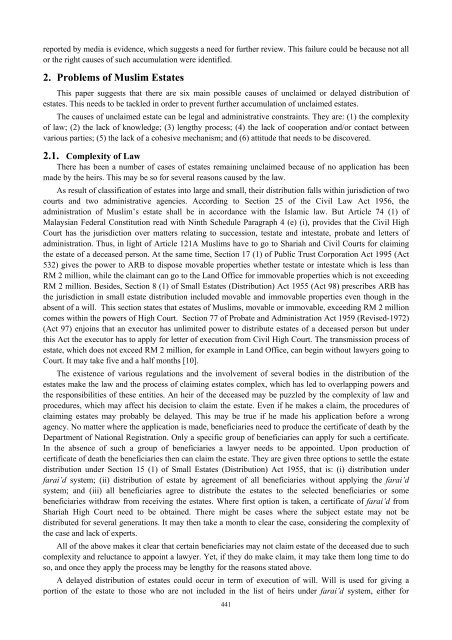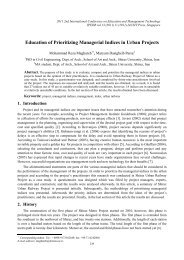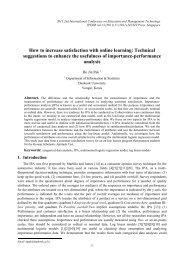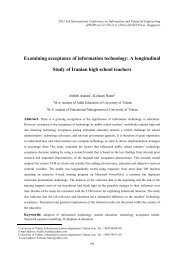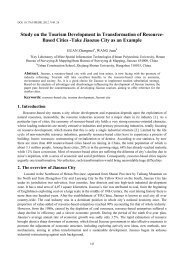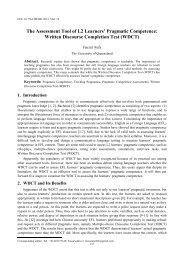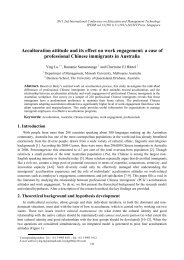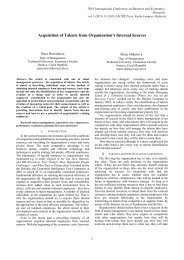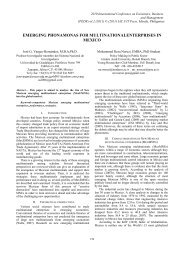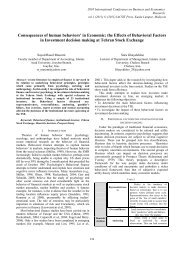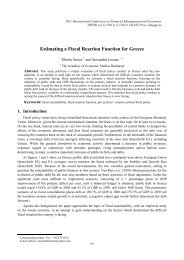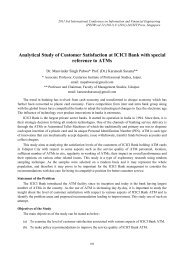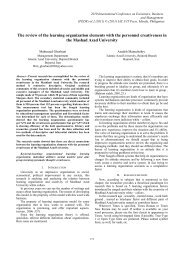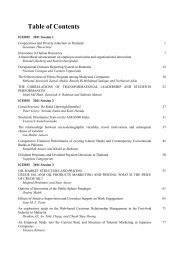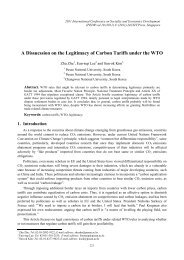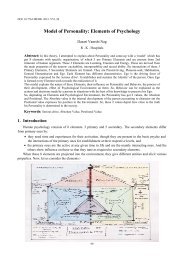The Causes of Unclaimed, Late Claimed or Distributed ... - ipedr
The Causes of Unclaimed, Late Claimed or Distributed ... - ipedr
The Causes of Unclaimed, Late Claimed or Distributed ... - ipedr
Create successful ePaper yourself
Turn your PDF publications into a flip-book with our unique Google optimized e-Paper software.
ep<strong>or</strong>ted by media is evidence, which suggests a need f<strong>or</strong> further review. This failure could be because not all<br />
<strong>or</strong> the right causes <strong>of</strong> such accumulation were identified.<br />
2. Problems <strong>of</strong> Muslim Estates<br />
This paper suggests that there are six main possible causes <strong>of</strong> unclaimed <strong>or</strong> delayed distribution <strong>of</strong><br />
estates. This needs to be tackled in <strong>or</strong>der to prevent further accumulation <strong>of</strong> unclaimed estates.<br />
<strong>The</strong> causes <strong>of</strong> unclaimed estate can be legal and administrative constraints. <strong>The</strong>y are: (1) the complexity<br />
<strong>of</strong> law; (2) the lack <strong>of</strong> knowledge; (3) lengthy process; (4) the lack <strong>of</strong> cooperation and/<strong>or</strong> contact between<br />
various parties; (5) the lack <strong>of</strong> a cohesive mechanism; and (6) attitude that needs to be discovered.<br />
2.1. Complexity <strong>of</strong> Law<br />
<strong>The</strong>re has been a number <strong>of</strong> cases <strong>of</strong> estates remaining unclaimed because <strong>of</strong> no application has been<br />
made by the heirs. This may be so f<strong>or</strong> several reasons caused by the law.<br />
As result <strong>of</strong> classification <strong>of</strong> estates into large and small, their distribution falls within jurisdiction <strong>of</strong> two<br />
courts and two administrative agencies. Acc<strong>or</strong>ding to Section 25 <strong>of</strong> the Civil Law Act 1956, the<br />
administration <strong>of</strong> Muslim’s estate shall be in acc<strong>or</strong>dance with the Islamic law. But Article 74 (1) <strong>of</strong><br />
Malaysian Federal Constitution read with Ninth Schedule Paragraph 4 (e) (i), provides that the Civil High<br />
Court has the jurisdiction over matters relating to succession, testate and intestate, probate and letters <strong>of</strong><br />
administration. Thus, in light <strong>of</strong> Article 121A Muslims have to go to Shariah and Civil Courts f<strong>or</strong> claiming<br />
the estate <strong>of</strong> a deceased person. At the same time, Section 17 (1) <strong>of</strong> Public Trust C<strong>or</strong>p<strong>or</strong>ation Act 1995 (Act<br />
532) gives the power to ARB to dispose movable properties whether testate <strong>or</strong> intestate which is less than<br />
RM 2 million, while the claimant can go to the Land Office f<strong>or</strong> immovable properties which is not exceeding<br />
RM 2 million. Besides, Section 8 (1) <strong>of</strong> Small Estates (Distribution) Act 1955 (Act 98) prescribes ARB has<br />
the jurisdiction in small estate distribution included movable and immovable properties even though in the<br />
absent <strong>of</strong> a will. This section states that estates <strong>of</strong> Muslims, movable <strong>or</strong> immovable, exceeding RM 2 million<br />
comes within the powers <strong>of</strong> High Court. Section 77 <strong>of</strong> Probate and Administration Act 1959 (Revised-1972)<br />
(Act 97) enjoins that an execut<strong>or</strong> has unlimited power to distribute estates <strong>of</strong> a deceased person but under<br />
this Act the execut<strong>or</strong> has to apply f<strong>or</strong> letter <strong>of</strong> execution from Civil High Court. <strong>The</strong> transmission process <strong>of</strong><br />
estate, which does not exceed RM 2 million, f<strong>or</strong> example in Land Office, can begin without lawyers going to<br />
Court. It may take five and a half months [10].<br />
<strong>The</strong> existence <strong>of</strong> various regulations and the involvement <strong>of</strong> several bodies in the distribution <strong>of</strong> the<br />
estates make the law and the process <strong>of</strong> claiming estates complex, which has led to overlapping powers and<br />
the responsibilities <strong>of</strong> these entities. An heir <strong>of</strong> the deceased may be puzzled by the complexity <strong>of</strong> law and<br />
procedures, which may affect his decision to claim the estate. Even if he makes a claim, the procedures <strong>of</strong><br />
claiming estates may probably be delayed. This may be true if he made his application bef<strong>or</strong>e a wrong<br />
agency. No matter where the application is made, beneficiaries need to produce the certificate <strong>of</strong> death by the<br />
Department <strong>of</strong> National Registration. Only a specific group <strong>of</strong> beneficiaries can apply f<strong>or</strong> such a certificate.<br />
In the absence <strong>of</strong> such a group <strong>of</strong> beneficiaries a lawyer needs to be appointed. Upon production <strong>of</strong><br />
certificate <strong>of</strong> death the beneficiaries then can claim the estate. <strong>The</strong>y are given three options to settle the estate<br />
distribution under Section 15 (1) <strong>of</strong> Small Estates (Distribution) Act 1955, that is: (i) distribution under<br />
farai’d system; (ii) distribution <strong>of</strong> estate by agreement <strong>of</strong> all beneficiaries without applying the farai’d<br />
system; and (iii) all beneficiaries agree to distribute the estates to the selected beneficiaries <strong>or</strong> some<br />
beneficiaries withdraw from receiving the estates. Where first option is taken, a certificate <strong>of</strong> farai’d from<br />
Shariah High Court need to be obtained. <strong>The</strong>re might be cases where the subject estate may not be<br />
distributed f<strong>or</strong> several generations. It may then take a month to clear the case, considering the complexity <strong>of</strong><br />
the case and lack <strong>of</strong> experts.<br />
All <strong>of</strong> the above makes it clear that certain beneficiaries may not claim estate <strong>of</strong> the deceased due to such<br />
complexity and reluctance to appoint a lawyer. Yet, if they do make claim, it may take them long time to do<br />
so, and once they apply the process may be lengthy f<strong>or</strong> the reasons stated above.<br />
A delayed distribution <strong>of</strong> estates could occur in term <strong>of</strong> execution <strong>of</strong> will. Will is used f<strong>or</strong> giving a<br />
p<strong>or</strong>tion <strong>of</strong> the estate to those who are not included in the list <strong>of</strong> heirs under farai’d system, either f<strong>or</strong><br />
441


